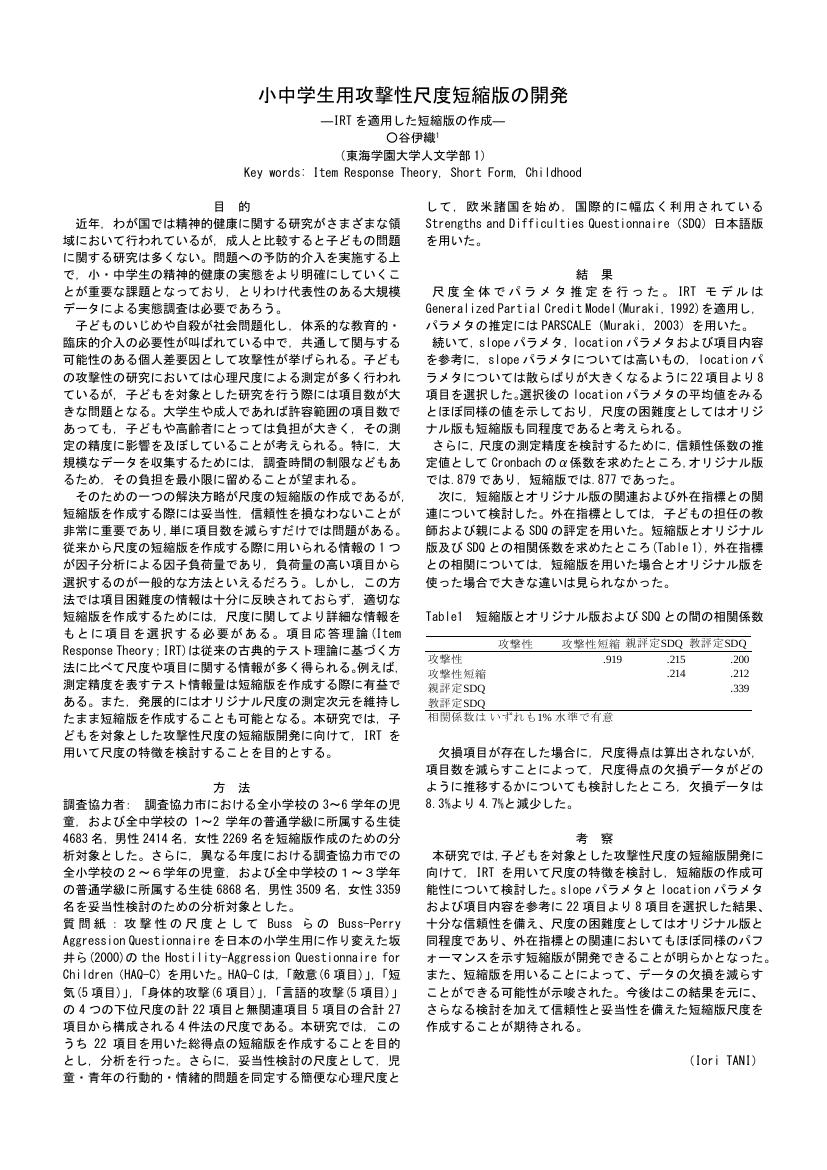1 0 0 0 P2-03 性格特性の5因子と共感性および孤独感の関連
- 著者
- 谷 伊織 天谷 祐子
- 出版者
- 日本パーソナリティ心理学会
- 雑誌
- 日本パーソナリティ心理学会発表論文集
- 巻号頁・発行日
- vol.18, pp.132-133, 2009
1 0 0 0 リラクセーション評価尺度短縮版の開発
- 著者
- 榊原 雅人 寺本 安隆 谷 伊織
- 出版者
- 公益社団法人 日本心理学会
- 雑誌
- 心理学研究 (ISSN:00215236)
- 巻号頁・発行日
- vol.85, no.3, pp.284-293, 2014
- 被引用文献数
- 9
The present study aimed to develop a short-form self-report measure to assess relaxation effects (S-MARE). Participants (<i>N</i> = 190) responded to a questionnaire comprised of 45 items assessing relaxation and non-relaxation based on the Relaxation Inventory (Crist et al., 1989). Exploratory factor analysis identified three factors: physiological tension, psychological relaxation, and anxiety. Each factor was related to 5 items and each had an acceptable Cronbach's coefficient (α = .93, .94, and .85). S-MARE scores pre- and post- relaxation instruction were significantly correlated with the Emotional Relaxation Scale (Tokuda, 2011) (<i>r</i> = .446) and with State Anxiety (<i>r</i> = –.531) (<i>N</i> = 172). There was a significant correlation between the amplitude of the high frequency component of heart rate variability during relaxation instruction and physiological tension scores on the S-MARE (<i>r</i> = .456—.474, <i>N</i> = 24). These results confirmed the reliability and validity of the S-MARE in terms of physiological correlation with cardiac parasympathetic tone, suggesting that the S-MARE is a valid measure of relaxation effects.
1 0 0 0 OA 小中学生用攻撃性尺度短縮版の開発
- 著者
- 谷 伊織
- 出版者
- 日本感情心理学会
- 雑誌
- 感情心理学研究 (ISSN:18828817)
- 巻号頁・発行日
- vol.21, no.Supplement, pp.1-1, 2013 (Released:2013-09-19)
- 被引用文献数
- 1
1 0 0 0 発達障害児の保護者における養育スタイルの特徴
- 著者
- 中島 俊思 岡田 涼 松岡 弥玲 谷 伊織 大西 将史 辻井 正次
- 出版者
- 一般社団法人 日本発達心理学会
- 雑誌
- 発達心理学研究 (ISSN:09159029)
- 巻号頁・発行日
- vol.23, no.3, pp.264-275, 2012
本研究では,発達障害児の保護者における養育スタイルの特徴を明らかにすることを目的とし,定型発達児の保護者との比較および子どもの問題行動,保護者の精神的健康との関連について検討した。対象者は発達障害児の保護者139名であり,質問紙調査によって,養育スタイル,子どもの問題行動(SDQ),子どものADHD傾向(ADHD-RS),保護者の抑うつ(BDI-II),睡眠障害(PSQI-J)を測定した。その結果,養育スタイルについては,発達障害児の保護者と定型発達児の保護者とで差がみられ,発達障害児の保護者においては,肯定的関わりや相談・つきそいの得点が低く,叱責,育てにくさ,対応の難しさが高い傾向がみられた。また,子どもの問題行動やADHD傾向が高いほど,肯定的関わりや相談・つきそいが低く,叱責,育てにくさ,対応の難しさが高い傾向がみられた。精神的健康については,肯定的関わりや相談・つきそいは抑うつ,睡眠障害と負の関連を示し,叱責,育てにくさ,対応の難しさは正の関連を示した。以上の結果から,発達障害児の保護者における養育スタイルの特徴が明らかにされた。最後に,養育スタイルに対する発達臨床的な介入の必要性について論じた。
1 0 0 0 Big Five尺度短縮版の開発と信頼性と妥当性の検討
- 著者
- 岡田 涼 谷 伊織 大西 将史 中島 俊思 辻井 正次
- 出版者
- The Japanese Psychological Association
- 雑誌
- 心理学研究 (ISSN:00215236)
- 巻号頁・発行日
- vol.83, no.1, pp.44-50, 2012
- 被引用文献数
- 5
This study developed a Japanese version of the Child Social Preference Scale, which measures children's social withdrawal. In addition, we examined developmental changes of children's withdrawal and the relationships between withdrawal and problematic behaviors. The participants were 7 012 mothers of preschool, elementary school, and middle school children. A factor analysis revealed a two-factor solution of shyness and social disinterest, which is consistent with previous studies. Shyness decreased as children's grade level increased. Social disinterest changed in a quadratic manner. The shyness score was lowest in the lower grades of elementary school. Shyness was related to more emotional symptoms, more peer relationship problems, and less prosocial behavior. Social disinterest was related to peer relationship problems. The importance of the distinction between shyness and social disinterest is discussed.

